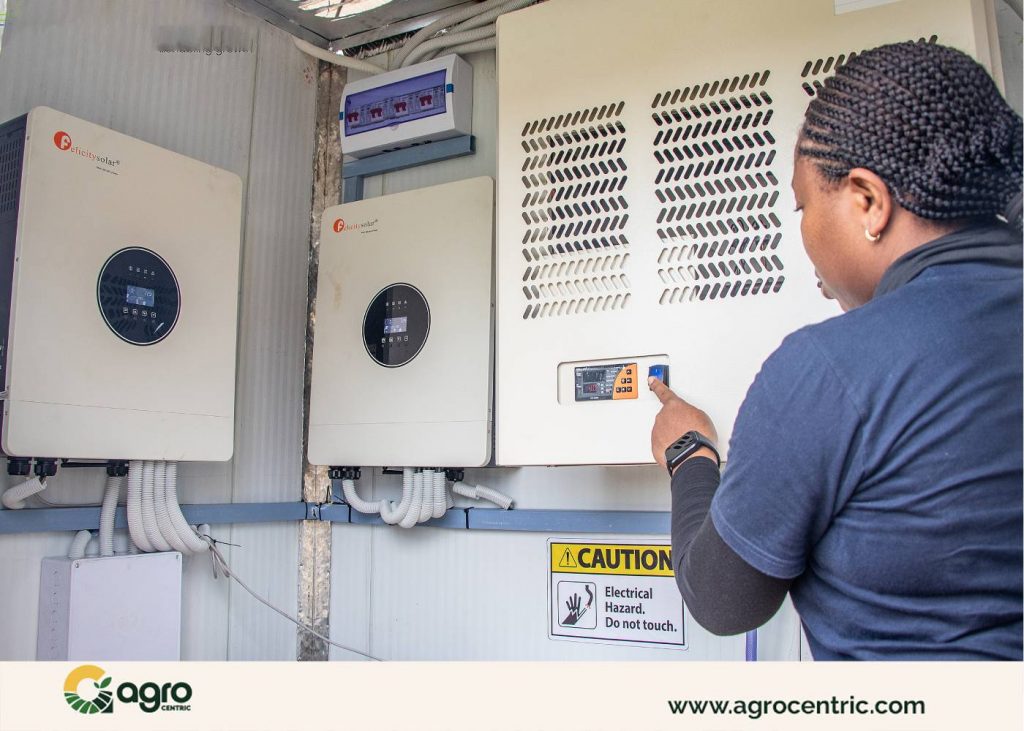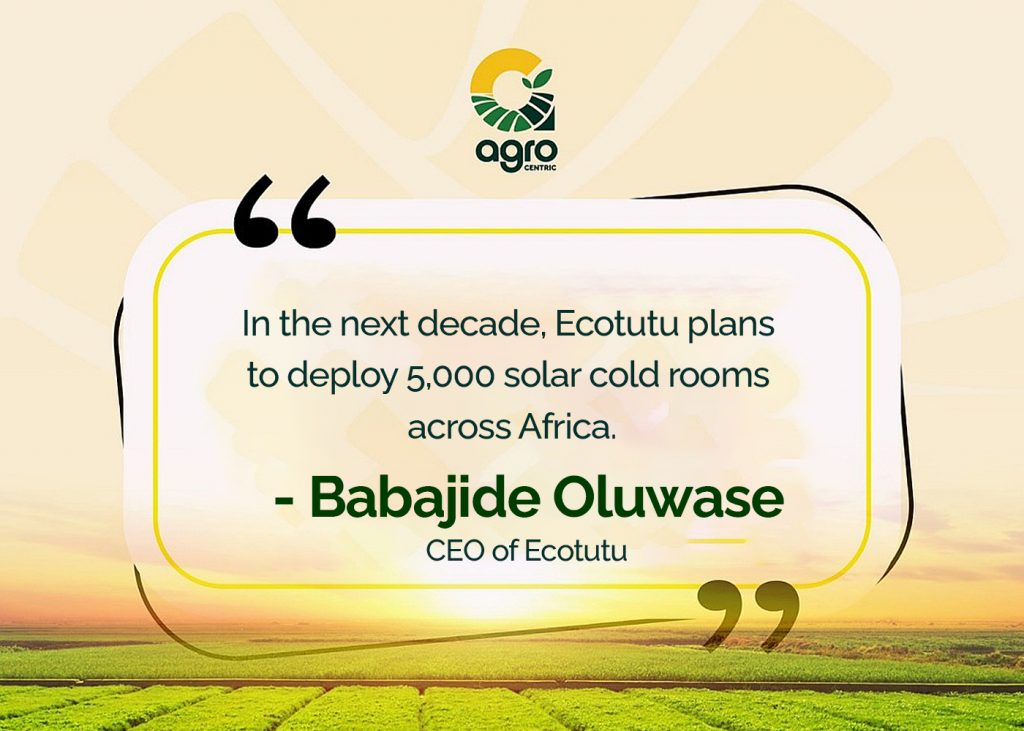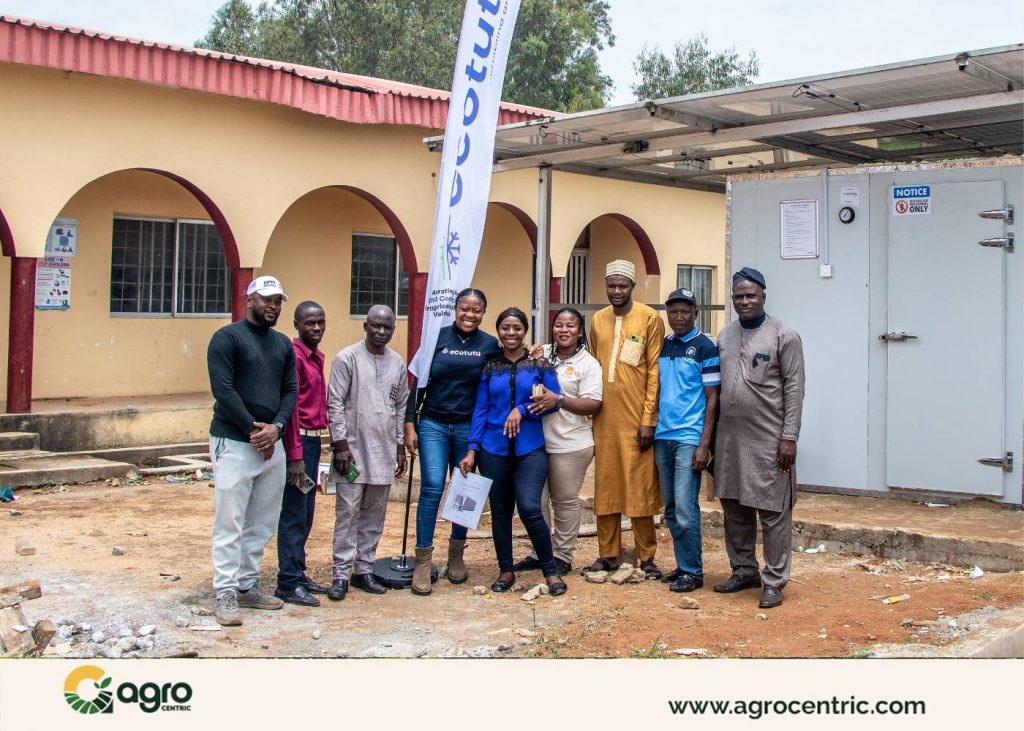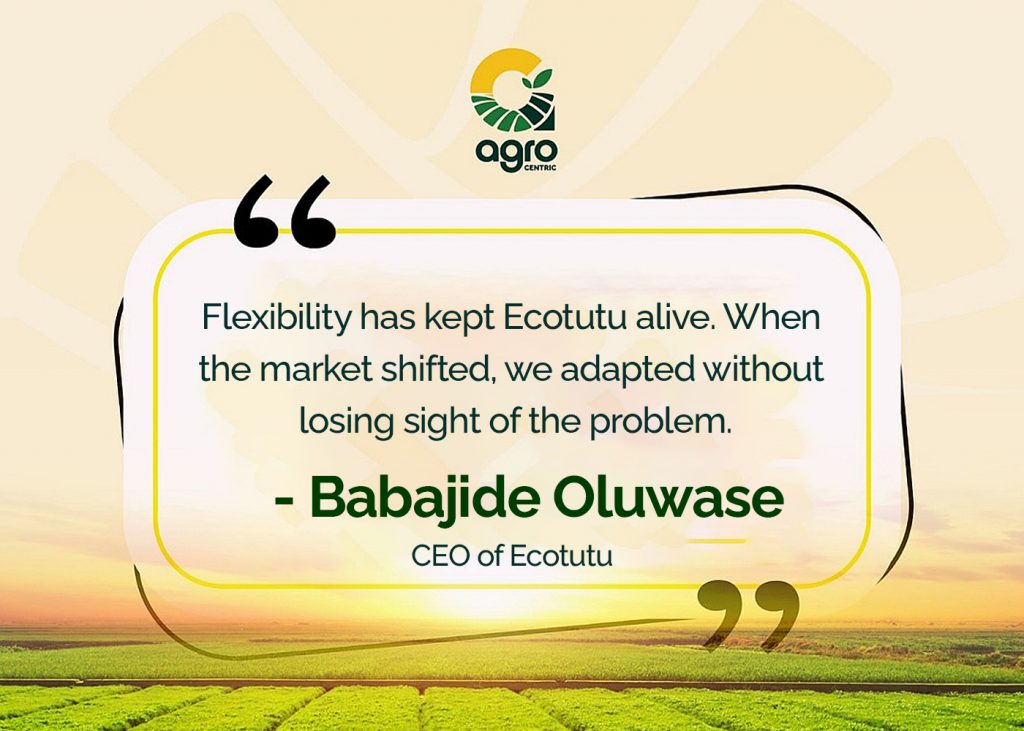
Across Nigeria’s bustling food markets, mountains of tomatoes and peppers spoil before they can be sold. Farmers lose income, traders lose trust, and consumers pay more for less.
For Babajide Oluwase, this was not just a statistic but a call to action. Having started in climate advocacy, he grew frustrated by its limits: “You can’t tell people not to cut trees if they can’t afford alternatives.” That realisation led him to build Ecotutu, which uses solar-powered cold chains to make storage affordable, reduce waste, and strengthen Africa’s food systems.
From its Pay-As-You-Chill model, where farmers pay as little as ₦250 per crate daily, to recognition from global organisations like the UN and Roddenberry Foundation, Ecotutu proves that African-led innovation can tackle one of agriculture’s most persistent challenges.
In this AgroCentric interview, Babajide shares how he moved from advocacy to enterprise, the obstacles of introducing cold chains in informal markets, and his vision for scaling across Africa.
Who is Babajide Oluwase? Can we meet you, learn about your background and education, and see what you’re doing now?
I’d describe myself as an impatient optimist, committed to building and solving problems. I have over 10 years of experience designing, building, and commercialising climate technology solutions, through ventures I’ve founded, co-founded, or consulted on. I’m currently the CEO of Ecotutu, a company that designs and deploys solar-powered cold chain solutions, particularly for businesses in the agriculture and health sectors. I also consult on sustainability-focused projects.
I hold a Master’s degree in Urban Management with Distinction from the University of Lagos through the DAAD Scholarship. My first degree was in Urban and Regional Planning at the Federal University of Technology, Akure (FUTA). Along the way, I’ve earned certifications, including ISO 14001 Lead Auditor, Venture Management at the University of Iowa Tippie College of Business, and a mini-MBA from Lagos Business School.
How did your urban and regional planning background influence your move into solving food storage and waste issues?
Urban and Regional Planning is a multidisciplinary field. From day one, we were told: “You are custodians of the environment.” That meant coordinating with engineers, architects, financiers, policymakers, you name it. We designed plans, co-designed them with communities, and worked with people to bring them to life. That training prepared me to work across disciplines and sectors. By my third year, I was already focused on environmental sustainability, waste management, and climate change. I began visiting secondary schools and markets with like-minded colleagues, sensitising people on what they could do to make a difference.
But after university, I realised advocacy has limits. You can tell people “don’t cut trees for firewood” because it harms the planet, but if firewood is the cheapest way for them to cook, they won’t stop. Alternatives like kerosene, gas, or electric stoves weren’t affordable. That’s when it dawned on me: I needed to create affordable options instead of just telling people what not to do.
That thought led to my first venture, RenewDrive, which converted agricultural waste into fuel briquettes, like charcoal, but from farm waste. While exploring that, we noticed a bigger problem and opportunity: why wait until waste is created before finding value in it? Why not address waste before it happens, especially the huge piles of spoiled tomatoes and vegetables you see daily in Nigerian markets? That insight evolved into Ecotutu.

So, how does Ecotutu address this problem with solar-powered cold rooms?
The real challenge is accessibility and affordability. Cold rooms aren’t new; big companies have always had them. However, small and medium-sized businesses couldn’t afford the infrastructure, generators, or running costs. So we introduced the “Pay-As-You-Chill” model. We set up solar-powered cold rooms at key market points. Traders bring their produce, say 100 kg of tomatoes, and rent crates for as little as ₦250 per day. They don’t have to worry about the technology or power supply; we handle it. They just store their goods and retrieve them when needed.
This helps them focus on their business, while we preserve their produce. Over time, we also link customers to quality buyers, helping with both preservation and access to markets. Solar power means we can set up anywhere, even where electricity is unreliable.
The name Ecotutu is unique. What’s the story behind it?
When we were naming the company, we wanted something indigenous and original, something that would stand the test of time. Since we knew we’d be in the cold chain space for a very long time, tútù (a Yoruba word for “cold”) felt perfect. Cold storage isn’t going out of fashion anytime soon. Even with AI, blockchain, or machine learning transforming industries, we’ll always need reliable cooling infrastructure to preserve what we produce.
The “Eco” part reflects our commitment to powering this infrastructure with clean energy. Right now, the most practical option is solar, but we’re also open to other clean energy sources as they become viable. Our goal is to ensure that as we grow and expand, we do so sustainably, building cold chain systems that are clean, affordable, and scalable. And that’s how the name Ecotutu came to life. Simple, easy, and true to our mission.
Can you share a success story or milestone that shows EcoTutu’s impact?
We’ve had many, but one stands out. A business in southwestern Nigeria aggregated produce and transported it to Lagos four times a week, using regular buses without cooling. It was expensive, risky, and stressful. If a bus broke down, the produce would spoil. With our cooling facility and trucks, they began storing produce closer to their farms, aggregating over days, and transporting just once a week under proper cooling. Costs dropped, efficiency improved, and they gained peace of mind.
Another story comes from Mile 12 Market. A woman trader who stored with us increased her revenue by over 40%. With the extra income, she could buy more supplies and better support her family. She was so emotional that she simply prayed for us, saying we’d given her peace of mind. Those moments remind us why we do this work.

You’ve shared some success stories, but getting started was challenging. What were your key difficulties in launching Ecotutu, and what challenges remain today?
Initially, one of the biggest challenges was understanding the market and identifying the right segment to serve. At first, we spoke to everyone, trying to figure out the real gaps and how best to position ourselves. We quickly realised there was a significant knowledge gap. People had been doing things a certain way for so long, and then here we were, young people, looking very “urban,” walking into rugged markets saying, “What problems are you facing? We have a solution.” Naturally, many didn’t believe we truly understood their struggles. We weren’t seen as market people, so we weren’t easily trusted, even when we proposed solutions.
That cultural pushback slowed adoption. It made us ask: who do we really want to serve? We didn’t have the luxury of time or resources to focus on a segment requiring years of cultural shifts and sensitisation. So we pivoted to those who already understood the value of the cold chain: businesses that just needed a more cost-effective solution. Our initial plan was to create small, portable cooling boxes that farmers or market women could afford individually. But when we studied this new segment, we saw they handled much larger volumes. They were middlemen and aggregators. A portable box wouldn’t work for them. So we shifted to cold rooms, bigger solutions that matched their needs.
Once we started serving that segment, something interesting happened: we were able to leverage their access and networks to begin sensitising the broader market. We also started collaborating with other stakeholders across the value chain, believing that the more knowledge spreads, the faster adoption grows. So, the first major challenge was cultural and knowledge gaps in the market.
The second challenge was resources. Moving from small boxes to larger solar cold rooms required significant capital. It wasn’t easy at first. We pulled together funds from family and friends and applied for grants. Our big breakthrough came in 2019 when we won the Tony Elumelu Foundation grant. That funding allowed us to build a proof of concept, not a massive cold room, but a walk-in solar-powered model that showed people what was possible. It was a turning point, and we began to take off from there.
Since Ecotutu was launched, you’ve been recognised both locally and internationally. How has this recognition impacted farmers’ incomes and food waste reduction?
First, recognition has put a spotlight on us. It made people pay attention, like, “there are some guys somewhere doing this work; check them out.” That visibility attracted financiers, partners, and even clients. You know how it works: before someone decides to partner with you, they want to see who you are, what you’ve achieved, and what affiliations you have. What they find often determines their level of confidence. So, local and international recognition placed us at a vantage point where people trusted us. Many chose to take a bet on us because they believed, “if this organisation or platform endorses them, then they must really be doing the work.”
We’ve also gained referrals. For example, someone might say, “I came across your work in this recognition and decided to reach out.” Some of those referrals have turned into actual business deals. Recognition has also positioned us at an ecosystem level. We’re now invited into rooms where discussions about strengthening Nigeria’s cold chain sector are happening, such as how we can improve it and integrate the cold chain into the broader food value chain. Being able to contribute our insights means we’re not just building solutions, but also shaping the narrative and the sector’s future. Ultimately, that benefits us too because we become part of the drivers of positive change across the country and continent. I could go on and on about how these recognitions have benefited us.

How do you envision Ecotutu contributing to food security and sustainable agriculture over the next decade in Nigeria and across Africa?
In the next 10 years, we envision deploying, directly and indirectly, over 5,000 solar-powered cold rooms across strategic food points on the continent. By then, we will also have processed billions of data points, creating visibility into how food moves from production to consumption across different markets. That kind of data will show who the largest suppliers and off-takers are, what types of produce dominate, and how frequently goods are moved.
We also expect to have unlocked hundreds of millions of dollars in financing, enabling wider adoption of cold chain infrastructure. Logistics must also be covered because cold rooms are only one part of the chain. Financing ensures the system works end-to-end. Finally, within the decade, we will have advised national and sub-national governments across Africa to integrate cold chain policies into their food security strategies. So, success in 10 years looks like this: from 54 African countries, at least 60% have robust cold chain systems, with Ecotutu playing a key role in making that vision a reality.
Are you developing innovations or product lines to support the agricultural value chain further?
You’d probably need to grab a long whip if I said no to that question! Absolutely. We’ve proven that our technology works and delivers value, and experimented with different business models. The next phase is all about distribution, setting up our solar-powered cold rooms at key points where they meet the needs of specific markets, and leveraging partnerships to make access easier and more efficient at scale. We’ve tested different technology mixes and are now focused on driving wider adoption. A big part is creating financial products that make cold storage more accessible and affordable for businesses.
At the same time, technology plays a huge role in optimising food movement, from the north to the south, and down to the last mile. We’re building systems that provide visibility across the value chain: how much perishable food is being moved, which suppliers, large, mid, or small, are involved, who the major off-takers are, what types of produce they handle, and how frequently they transact. These data points are powerful. They make attracting financing, expanding operations, and scaling more sustainably easier.
So, in summary, we’ve laid a solid foundation, working with partners across the value chain. Now we’re focused on expanding distribution, rolling out financial solutions for small and medium-sized businesses, and ensuring full visibility of how food moves from production to consumption.
What lessons from your entrepreneurial journey can other young entrepreneurs learn?
Looking back, I’d highlight four key lessons from my journey. First, I was at least somewhat clear on the problem I wanted to solve, even if the exact path wasn’t obvious. From the start, I knew I wanted to tackle food waste and the lack of affordable solutions to prevent it. Along the way, we experimented with many approaches: portable cooling boxes to walk-in solar cold rooms, logistics services linking markets to smaller off-the-shelf preservation products, and even data visibility solutions across the value chain. All of these were different ways of addressing the same core issue. That clarity, or partial clarity, about the problem kept us grounded. Without it, we might have abandoned the journey entirely.
Second, you must be flexible. Earlier, I spoke about engaging certain market segments. At first, we faced cultural barriers: people were used to doing things a certain way and didn’t immediately trust our solution. Educating them required time and resources we didn’t have. So, we pivoted to a segment that already understood the value of cold chain but needed a cost-effective option. Flexibility allowed us to adapt and continue solving the same problem in a viable way. Without it, we might have wasted time, effort, and money insisting on a single rigid path. Flexibility means paying attention to how the market shifts and the industry evolves, and being willing to iterate and improve your ideas.
Third, be willing to ask for help. Entrepreneurship is challenging, frustrating, and exhausting, especially when your hard work doesn’t get immediate traction. You can’t do everything alone. Help comes in many forms: bringing partners on board, reaching out to industry experts, or simply asking someone to share their experience. You’ll need different kinds of support, financing, strategy, product development, HR, compliance, and legal advice at different points. Being open to asking reduces the mental burden and increases your chances of moving forward. You won’t always get the help you ask for, but often you will.
Fourth, maximise every opportunity. When we received the Tony Elumelu Grant in 2019, about 1.5 million naira, we could have spent it loosely. Instead, we invested it in building a proof-of-concept cold room. That prototype generated real interest: people asked, “How much would it cost to build one for us?” or “Can I come and see it?” Those conversations proved invaluable. Similarly, through programs and fellowships I joined, I gained knowledge and gave back, showing how the resources helped us grow. This visibility led to referrals, partnerships, and clients.
Being an entrepreneur in Nigeria can be very taxing, especially with the nature, frequency of changes and gaps in implementation of policies by various governments. What policies currently affect your business, and how are you dealing with them? And, how do you maintain motivation and resilience in the face of these challenges?
The first policy that comes to mind is actually one that has positively influenced my business: the fuel subsidy removal. That brought the cost of energy from petrol and diesel closer to the cost of solar. Before subsidy removal, many businesses would simply build a cold room and run it on a generator. Petrol was relatively cheap, about ₦150 per litre. If you ran 15 litres daily, that came to about ₦2,500 – ₦3,000 daily, which wasn’t considered too high. So businesses saw no real incentive to make the larger upfront investment in solar-powered cold rooms.
With fuel at around ₦1,000 per litre, that same 15–20 litres a day costs nearly ₦20,000 daily. The cost becomes staggering when you do the math over weeks and months. Suddenly, solar makes far more economic sense. That shift has driven significant uptake of our solutions through our Pay-As-You-Chill model and outright purchases by businesses that can afford it.
On the other hand, one policy that negatively affects us is the high import duty on key components. We still have to import many of our parts, and the taxes and complex processes make those components very expensive when they reach us. That cost inevitably gets passed on to customers, particularly those who want to buy their own cold rooms outright. For some, the higher price makes it harder to purchase quickly. If the government is truly serious about food security, it needs to recognise that food security doesn’t stand alone; it’s a system. Preservation infrastructure like cooling is part of that system. Providing incentives or tax relief for businesses like ours would go a long way in strengthening food security.
So for me, it’s a balance: on one hand, we have a positive policy shift creating demand; on the other, we have structural barriers that make scaling more expensive than it should be.

So lastly, how do you think platforms like ours, Agrocentric.com, a media platform, can help amplify the work of changemakers like yourself?
Platforms like yours, which focus on innovations and businesses in agriculture, play a huge role in amplifying voices across the sector. By doing so, you’re not just telling stories, you’re gradually building momentum toward real solutions for a stronger and more resilient food system.
There’s also the visibility factor. Let’s say someone is searching online for “Ecotutu,” cold chain solutions, or similar businesses in the value chain. If your platform is well-ranked and our interview pops up, that discovery can open doors, whether with partners, investors, or clients. And those opportunities go a long way in keeping us motivated, in business, and moving forward instead of giving up.
Thank you, Babjide. Ecotutu’s story shows that solving Africa’s food security challenge requires more than talk; it takes innovation rooted in empathy and sustainability.
You can connect with Babajide on LinkedIn and learn more about Ecotutu, and discover how they’re shaping Africa’s food future.